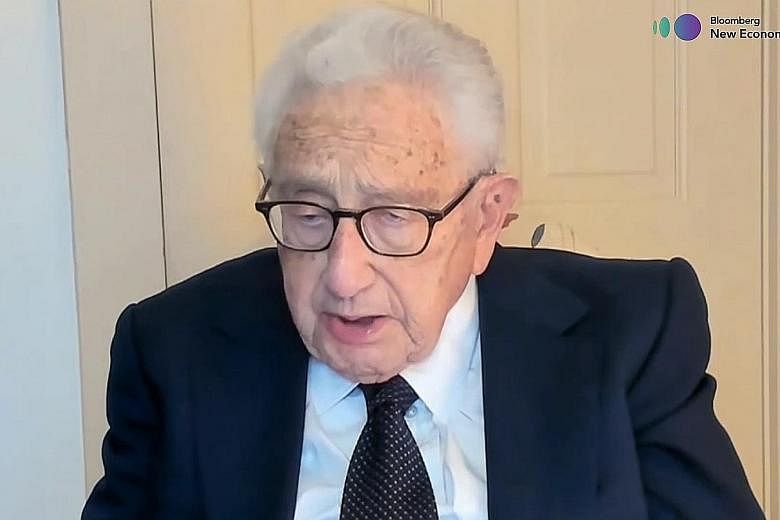The United States and China must find some basis for cooperation, or risk sliding into a catastrophe "comparable to World War I", former US secretary of state Henry Kissinger said at a global forum, delivering a stark warning on the state of ties between the two superpowers.
"I'm not saying that we and China will live with a consciousness of harmony. I am saying that there will always be stresses and tensions. The question is, 'Is there a direction in which we can cooperate?' " said Dr Kissinger.
Speaking at the Bloomberg New Economy Forum on Monday, which is being held virtually this year, he was among some former senior US government officials who laid out how they thought President-elect Joe Biden should tackle US-China ties when he assumes office in January next year.
Under the Trump administration, bilateral relations have sunk to their lowest point in decades. Both sides are increasingly at odds on issues ranging from security to trade to technology.
Dr Kissinger, who also spoke at the same forum in Beijing last year, had said then that both countries were in the "foothills of a cold war".
"I think we're in the mountain path just now, and it's a process that should not continue," he said on Monday, adding that there was a danger of a "great catastrophe" if both sides slipped into war and conflict.
Mr Biden would need to open a path of dialogue with the Chinese leadership, he said, adding that both sides need to agree that "whatever other conflict they have, they will not resort to military conflict".
Both countries should also create an "institutional system" where each president appoints a special representative to remain in contact on behalf of their presidents, he said.
Having agreed to avoid the possibility of war, both sides can "move towards issues we should achieve", he added.
Meanwhile, forum co-chairman Henry Paulson, a former US treasury secretary, said Washington needed to adopt a new approach to dealing with China, which he called "targeted reciprocity".
"We need reciprocity targeted, not at anything and everything China does; instead, the US should aim its demands for reciprocity at sectors and areas where America is the strongest and most competitive," he said, adding that a Biden administration should link tariff rollbacks based on extracting reciprocal benefits from China.
For instance, he pointed out that China has resisted World Trade Organisation negotiations to lift tariffs on environmental goods and services, which has made it difficult for US firms seeking to enter China to help clean up its polluted environment, a US$3 trillion (S$4 trillion) business opportunity.
He also said that it was in the interest of Americans, Chinese - the world's two largest economies - and the world, that the US and China find "a way to reboot global economic growth" in the wake of the Covid-19 pandemic.
"Competition without unnecessary confrontation should be our goal, because confrontation without effective competition has produced some poor results for the American people," Mr Paulson said.
Delivering a separate address, Chinese Vice-President Wang Qishan said Beijing was "prepared to expand the confluence of interests with other countries", and continue to open the Chinese market to the world.
While Mr Wang did not reference the US directly during his nine-minute speech, he called on countries to rise above exclusive blocs and reject a "zero-sum mentality". He said: "We are well aware that in today's world, interests of all countries are closely intertwined. China will do well only when the world does well, and when China does well, the whole world will benefit."

